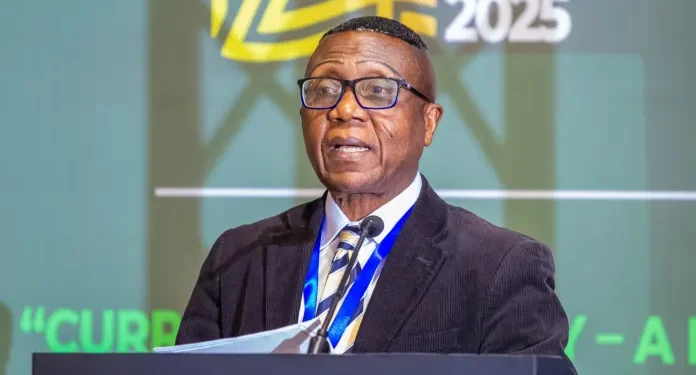Sustaining Ghana’s Macro Gains Hinges on Currency Stability, Production and Innovation – Bank of Ghana
The Bank of Ghana (BoG) has emphasised that the country’s recent macroeconomic gains can only be sustained if currency stability is tightly linked with increased domestic production and innovation, as the economy transitions from short-term stabilisation to long-term, self-sustaining growth.
Delivering a speech on behalf of the Governor, Dr Johnson P. Asiama, at the 14th Ghana Economic Forum (GEF) in Accra, Dr John Kwakye, Advisor to the Governor, said that while macroeconomic indicators have improved, the next phase of Ghana’s recovery must focus on structural competitiveness.
“Stability without production is unsustainable, and production without innovation stagnates. To sustain growth, these three pillars – stability, production, and innovation – must interlock,” Dr Kwakye stated.
He observed that tighter monetary discipline, improved market sentiment, and the recovery of key sectors have strengthened Ghana’s macro framework. However, he cautioned that macroeconomic stability is not an end in itself, but a foundation upon which the real economy must grow.
“The value of a currency cannot be defended forever by intervention; it must be earned by what the economy produces,” he added.
According to the BoG, its next phase of policy direction will focus on deepening the link between macro stability and the real sector by promoting value addition, industrialisation, and innovation-driven growth.
Dr Kwakye cited the new Gold Board Act as an example of how ongoing reforms in gold trading and reserves management are turning Ghana’s natural resources into strategic national assets rather than mere export commodities.
He further noted that digital innovation, especially within fintech and payments systems, will be a major driver of competitiveness, financial inclusion, and efficiency, as improved infrastructure and regulation strengthen trust and transparency in the financial ecosystem.
“When paired with a stable currency and a productive base, innovation transforms resilience into sustained growth,” he remarked.
Beyond internal policy measures, the Bank also called for stronger collaboration between government, financial institutions, and the private sector, particularly in expanding long-term credit to manufacturing and agri-processing industries.
Dr Kwakye warned that as Ghana approaches an election year, maintaining fiscal discipline and policy consistency will be critical to preserving the progress achieved so far.
“The gains we have achieved are not trophies to display; they are responsibilities to defend,” he cautioned.
The BoG reiterated that the durability of the cedi’s stability will depend on continued investment in productive capacity, supported by reliable energy supply, consistent regulation, and innovation adoption.
“When stability, production, and innovation reinforce each other, growth becomes self-sustaining,” Dr Kwakye concluded.
The 14th Ghana Economic Forum was held under the theme “Currency Stability – A Reset for Sustainable Economic Growth”, bringing together policymakers, business leaders, and economists to deliberate on strategies for building a resilient and competitive economy.








